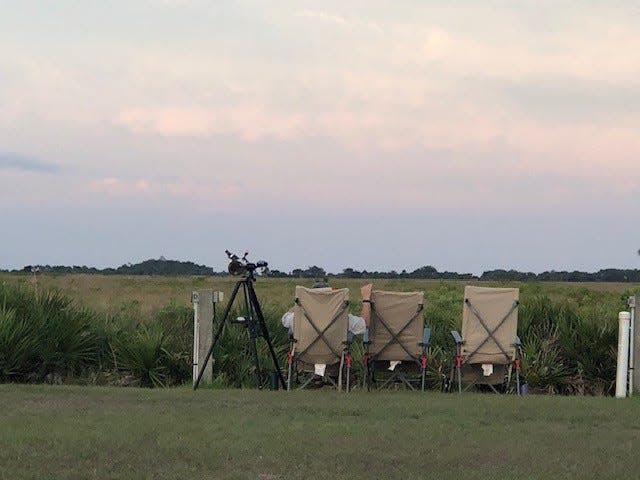Space impacts on stargazing and silence from sheriff's office | In FLORIDA TODAY
A few years ago, on what became the coldest night of the year, I’d booked a camping trip for my family to the Kissimmee Prairie Preserve State Park for the sole purpose of looking up at a dark night sky.
We’re not really a camping family so there was a last-minute scramble to buy warm sleeping bags, long underwear and everything else that goes into making sleeping outside in the cold tolerable.
Ultimately, the cold scared us and the park allowed us to defer for a few weeks. It was still cold when we did end up camping overnight. Our telescope broke. We shivered a lot. None of us slept well; there was too much ill-defined rustling nearby.

But the sky was dark and twinkling stars scattered in every direction above as we lay on our backs. It wasn’t quite the zero-light pollution experience I’d anticipated but the night sky shined in a way I'd never seen before. The view inspired me. While I wish I were a better-informed stargazer, I have been known to rush outside to glimpse a SpaceX Starlink satellite “train” or the glinting International Space Station passing overhead.
That’s why Space Reporter Brooke Edwards' story about how satellites, particularly these new constellations of satellites like Starlink and soon Amazon’s Kuiper, are changing our night sky, caught my interest. It’s not an “existential threat,” as one astronomer put it, but the impact is accelerating like light pollution and could put our night view at risk.
Next launch?: Is there a launch today? Upcoming SpaceX, NASA, ULA rocket launch schedule in Florida
“When you talk about the prospect of, a decade or so from now, of 60,000 or several hundred thousand satellites in orbit – then it starts to be very hard to see the sky through all these satellites,” an astrophysicist told Edwards.
We paired that story with a piece by our other space reporter, Rick Neale, looking at the numbers behind SpaceX’s dominance of the launch industry. Here's one number to hold onto: Forty-three of the Space Coast’s 45 launches so far this year have been by SpaceX.
Also please don’t miss Engagement Editor John A. Torres’ column about the sheriff’s silence in the face of public safety incidents. We don’t often put columns on the front page, particularly on Sunday. But this one is important, and we’ve heard from many of you frustrated at the lack of information when they see the sheriff’s helicopter overhead or deputies with guns drawn. It’s not us not reporting what's happening — it’s Brevard County Sheriff’s Office not providing information. Our community would be better served by updated public safety information instead of jokey social media programming.
On a lighter note, I’ll close by calling your attention to a story inside Sunday’s FLORIDA TODAY. It’s a piece by Education Reporter Finch Walker that will make you feel good about the next generation. Finch talked to two groups of teen inventors, from Bayside and Viera high schools, who participated in a national Junior Achievement competition.
One of their inventions was a sleeping bag that contains a heating element and would be beneficial not only for campers (it would have come in handy on our stargazing trip) but also for the homeless.
I can’t wait to see what the teens do with their inventions.
Thanks for reading FLORIDA TODAY and supporting local journalism. Reach out to me if you have any questions or thoughts about our coverage.
Executive Editor Mara Bellaby can be reached at mbellaby@floridatoday.com.
This article originally appeared on Florida Today: Space impacts on stargazing, BCSO silence in FLORIDA TODAY

